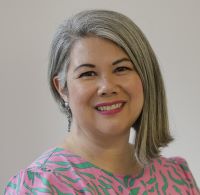CFG's Deputy CEO Sarah Lomax shares her lived experience of racism, and highlights the importance of data collection and self-reflection for dismantling racism and building a more equitable workplace.

I first experienced racism at the age of five or six, in the small town where I grew up in Nova Scotia, Canada. My mother was the only Chinese person living there. My classmate’s mother wouldn’t let them come to my birthday party and I was bullied by a peer for my Chinese heritage.
My Chinese name, given to me by my parents and used by them when I was a child, now only exists only on my birth certificate. It's not on any other official documentation. At a young age, I had decided to excise that part of me.
It wasn’t until I moved 2000km away to go to university that I met people who looked like me, and who recognised my mixed heritage. When I moved to the UK, first to Oxford and then to London, I found even more people like me. It was a breath of fresh air! I don’t share this to denigrate people in my town; there were many who welcomed us with open arms. But it is my lived experience.
Despite my early experiences of racism, I have privilege. I have benefited from a ‘white’ surname and look ethnically ambiguous. All my experiences of racism were when I was a child or teenager. I am sure many of us have heard stories about people within the sector who have unsuccessfully applied for roles with names they were born with and then changed their CV to their partner’s more ‘English’ surname, and started getting calls for interview.
This happened to a friend of mine 23 years ago and, very recently, I heard the same from someone else. Nearly a quarter of a century has passed between those two instances – and nothing’s changed?
These experiences – that are not only my own – prompted me to join the Civil Society Group’s Dismantling Racism working group as CFG’s representative. The groups’ Dismantling Racism report talks of anti-racist leadership behaviours, including 'vulnerability to share my own journey and growth, role modelling within the charity and sector, having an external voice on race equity, creating safety for everyone to share experiences, and normalising talk about wider society race issues at work'.
The report also highlights the need for data. As I continue my leadership journey at CFG, I want to ensure that CFG continues to build an anti-racist organisation. This includes looking at our systems and exploring how we can capture meaningful data to facilitate richer conversations and to generate positive actions.
Alongside participating in the working group, I have also joined Zoe Amar’s group for those of Chinese heritage who are working in the sector. This has been a joy and, in a way, is healing my old wounds.
I was recently struck by something I heard at the Charity Times annual conference. A speaker urged the audience to explore how diverse you are, as a person. They asked: what do you expose yourself to? Who’s in your friendship group? How do we educate ourselves and apply what we learn about anti-racism?
This truly resonated with me, and I mean to put it into practice. I also recommend getting involved with the New Ways Community event series for people building equitable workplaces - Crucial Conversations.
I am an optimist. I believe we can effect change in our sector and society if we put our minds and hearts and, most importantly, resources, to the task – and to keep sharing our experiences.
I know it may seem difficult at times to balance this against the regular day-to-day workload, but as leaders we must keep anti-racism front and centre. I don’t want any more children to erase a part of themselves so that they can feel more valued.
This article was first published in Charity Times magazine, summer 2024.